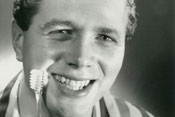I was there: First UK TV ad shown, 1955
Brian Palmer, a copywriter on the Gibbs SR ad, tells his story:
The biggest thrill was sitting in my tiny little flat in Notting Hill on 22 September 1955 with my mates from the agency. It was the first night of this untried new medium, and we didn't know that the commercial I'd written for Gibbs SR toothpaste would be the first to air - it was chosen by drawing names out of a hat. But suddenly the commercial that we had worked on was on-screen.
I got inspired to go into TV about a year before. I had heard a talk by the head of one of the American networks, who was very evangelical about the idea and described it as the greatest selling medium ever seen. I asked my creative director at Young & Rubicam, George Plant, if I could become a specialist in it, got trained and then became the main creative in TV at the agency. I remember my immediate boss, the copy chief, telling me 'You're mad, Brian. It will never be a major medium.'
I really enjoyed the combination of words and sound and vision. You could talk to people in their own homes. I was all of 25, and at that age you're not thinking about global things - you're thinking about how to pay the rent and whether you will get promoted.
It really made me, because I became head of Y&R's television operations, and television became the biggest part of our billing, then I rose through the ranks to become joint creative director. I became the youngest ever member of the board in 1961, so I really got on a fast track.
Back then not only did we write the ads, we sometimes had to appear in them too! The art director on Gibbs SR toothpaste wanted an "ordinary looking bloke "for a press ad. so why pay for a model.
I was there: Launch of UK's first mobile phone, 1986
Kevin Lawless, managing director of Wireless Economics, recounts his strategy as Motorola's marketing head in introducing the to launched the UK's first mobile:
Today's BlackBerry owners were the sort of people who bought Motorola's DynaTAC 'brick' mobile phone when it launched in 1986.
I was head of Motorola's UK and Ireland sales and marketing. But, to be honest, marketing probably had only a 10% influence on the outcome of the product - it was really 90% engineering-led. Marketing was a voice somewhere near the end of the process and we focused on placing the product, nothing more complicated than that. We got TV coverage on the BBC's flagship chat show Wogan and used that to push the product into the business community.
Marketing was extremely tactical and we fell into all the traps of a reactive business. We met on a Monday, did things on a Tuesday and saw the results on Friday. The next Monday, we'd change it all again. If I had my time again, I would take at least 10%-15% out of every month to really think about a solid strategy.
The main challenge was keeping up with demand. I used to get 'Do you know who I am?' calls from MPs and celebrities asking for freebies and had to say no. We got 100 calls a day and could only install 10 a day, so we worked out a way to put people into a holding pattern by saying we had to do preparation surveys and get things ready for them, but it was nonsense.
To be honest, I didn't realise how big this was until about 1991, when the penny dropped that this was going to change the way we all live.
Marketing would like to hear your story, just add it below.


